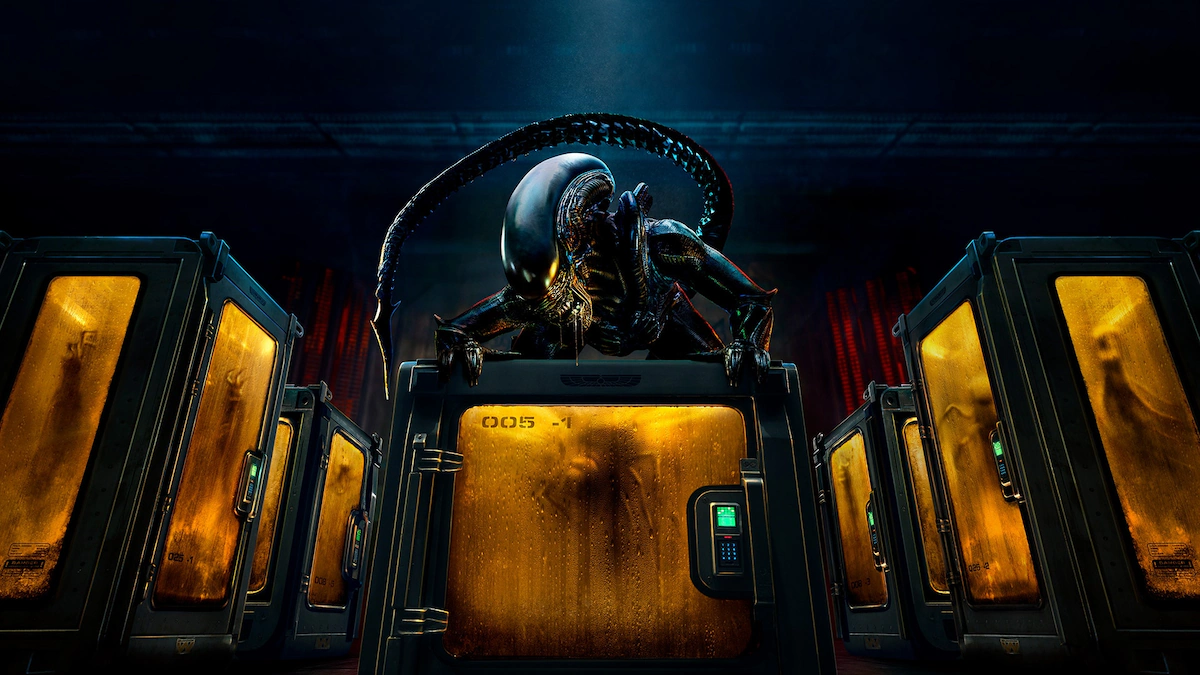When Alien: Earth crashes onto the screen, it promises far more than nostalgia or recycled terror. This is not just another entry tacked onto a beloved franchise—it’s a meticulous reimagining, one that dares to challenge the very fabric of the Alien mythos. Set in 2120, two years before the original Alien film, it navigates a chillingly familiar universe while boldly expanding its lore, combining retro-futuristic dread with philosophical undertones and unflinching body horror.
Created by Noah Hawley, the mind behind Fargo and Legion, the series exudes a confidence that’s rare in long-running franchises. It balances horror with thoughtful sci-fi, crafting a tone that feels both reverent to Ridley Scott’s original vision and daringly experimental. Instead of simply relying on the iconic Xenomorph to carry the fear factor, Alien: Earth builds a richer, more unsettling landscape of human ambition, corporate greed, and genetic manipulation gone wrong.
A Cinematic Experience on the Small Screen
One of the most striking qualities of Alien: Earth is its sheer visual grandeur. The ultra-wide cinematography, tactile production design, and film-quality visuals blur the line between high-budget cinema and prestige television. The series embraces a gritty retro-futurism—complete with sweat-stained uniforms, metallic corridors, and a constant hum of industrial machinery—that makes its world feel oppressive, lived-in, and uncomfortably real.
Every frame is designed to immerse viewers into a claustrophobic reality where technology and decay exist side by side. The visual palette is both familiar to long-time Alien fans and innovative enough to keep the aesthetic fresh. It’s not a glossy, sanitized vision of the future—this is a grimy, dangerous place where humanity’s reach has clearly exceeded its grasp.
Plot: Synthetic Souls and Corporate Overreach
At the heart of the series is Wendy, a hybrid creation born from the ambition of tech magnate Boy Kavalier. Once a terminally ill child, Wendy’s consciousness has been transplanted into a synthetic adult body, making her one of many “Lost Boys” engineered to outlive death. This chilling pursuit of immortality not only questions the ethics of technology but also blurs the line between human identity and artificial existence.
Wendy’s life takes a drastic turn when a Weyland-Yutani science vessel crashes on Earth, unleashing alien organisms—including, of course, the Xenomorph—into the planet’s population. As the chaos spreads, Wendy finds herself caught between corporate machinations, alien threats, and her own desperate need for connection, particularly with her brother, Hermit.
The central theme here isn’t just survival—it’s the exploration of what makes us human when our bodies are no longer our own. By embedding this philosophical question within the context of a sci-fi horror, the show deepens its emotional impact.
An Uneasy Blend of Innocence and Horror
The series leans heavily on Wendy’s unique condition to create emotional tension. The idea of a child’s consciousness in an adult synthetic body is inherently disturbing—an unsettling mixture of innocence, vulnerability, and latent power. While some viewers may struggle to fully connect with such a complex character dynamic, Wendy’s longing for her brother adds an emotional through-line that humanizes the horror.
This tension is further layered with Peter Pan–like undertones—the “Lost Boys” moniker is no accident—giving the series a strange, almost fairy-tale quality that’s warped into something deeply unsettling.
Body Horror Without Boundaries
While the Xenomorph is undeniably the franchise’s crown jewel, Alien: Earth refuses to lean on it as the sole source of fear. Instead, the series introduces a variety of biological nightmares, from parasitic eyeballs to vampire-like termites and even zombie sheep. These grotesque creations keep the horror fresh, ensuring that viewers never know what terror might emerge next.
Crucially, these horrors are not merely spectacle. They serve as metaphors for the dangers of unchecked experimentation, corporate hubris, and humanity’s obsession with control over nature. The creature design is imaginative yet deeply tied to the show’s themes, making every monster more than just a jump scare.
Corporate Ambition as the True Villain
Perhaps the most terrifying element of Alien: Earth is not the aliens, but the humans who think they can control them. Boy Kavalier’s corporate empire treats children’s bodies and minds as commodities, reshaping them into “forever people” who can be used, exploited, and discarded at will. It’s a chilling reflection of real-world tech culture’s ethical blind spots, amplified to dystopian extremes.
The result is a layered villainy where human greed is just as lethal as any alien infestation. In many ways, the show’s real horror lies in its depiction of a world where morality is easily overridden by profit margins.
Critical Acclaim and Divided Opinions
The show has garnered significant praise from critics, many calling it the most compelling addition to the franchise since Aliens. Reviewers have highlighted its atmospheric tension, high production values, and bold narrative choices. The writing is celebrated for weaving in philosophical and ethical dilemmas without sacrificing the intensity that fans expect.
However, not all feedback is glowing. Some critics point to uneven pacing and tonal shifts that can feel jarring—moving from visceral horror to philosophical musings in the span of a few scenes. While this blend of genres works for many, it risks alienating viewers who prefer a more straightforward approach.
Fan Reactions: Awe and Frustration
Among fans, Alien: Earth has sparked lively debate. Some praise it as a return to form, lauding its embrace of corporate horror and atmospheric dread. Social media buzz often describes it as one of the most impressive sci-fi shows in recent memory.
Others are more skeptical, criticizing certain CGI elements or suggesting that it sometimes resembles a low-budget Blade Runner. Purists argue that it strays too far from the core essence of Alien, focusing more on philosophical themes than on the Xenomorph itself. Yet, even among the critics, there’s an acknowledgment of the show’s ambition and willingness to take risks.
Visuals That Mesmerize, Tones That Clash
The visual execution is undeniably one of Alien: Earth’s greatest strengths. But the tonal balance—oscillating between grotesque horror and thoughtful sci-fi—won’t work for everyone. Some will find this combination exhilarating, a breath of fresh air in a franchise that could have easily relied on formula. Others may see it as an identity crisis.
Still, these tonal shifts are deliberate, a hallmark of Noah Hawley’s style. They invite viewers to engage with the material on multiple levels—intellectually, emotionally, and viscerally.
Conclusion: A Daring Reinvention
Alien: Earth is not a comfort-food prequel for franchise loyalists—it’s a bold, unsettling reinvention that refuses to play it safe. By blending horror, philosophy, and corporate critique, it expands the Alien universe into new and often disturbing territory. It may not satisfy everyone’s expectations, but its ambition and execution make it one of the most intriguing sci-fi horror shows in recent years.
Whether you come for the monsters, the moral dilemmas, or the haunting visuals, Alien: Earth ensures that you leave with questions—and maybe a few new nightmares.










